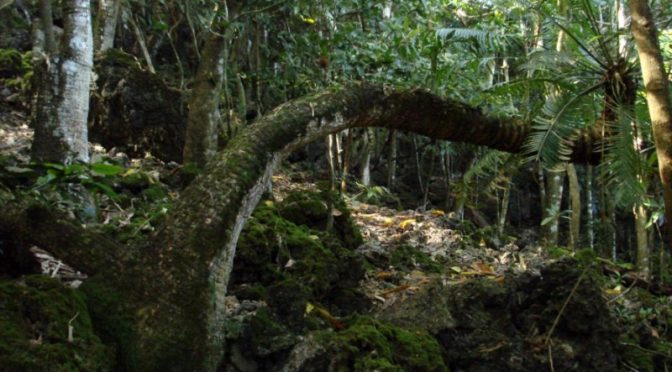Human activity continues to shape environmental systems around the world creating novel ecosystems that are increasingly prevalent in what some scientists call the Anthropocene (the age of humans). The island of Guam is well known as a textbook case for the devastating effects of invasive species on island ecosystems with the extirpation of most of the forest dwelling birds due to brown tree snake predation. The loss of native birds has resulted in a loss of forest seed dispersers. Recent research conducted by lead author Ann Marie Gawel, based on her University of Guam master’s thesis, has found an unlikely forest ally, feral pigs.
With the loss of birds in the limestone forests on Guam, seed dispersal for native plants has become problematic. The damage caused by ungulates, introduced deer and pigs, has been documented in tropical forests worldwide. Less documented is the effect of these animals on seed dispersal of native and nonnative forest plant species.
Gawel’s study examined scat from deer and pigs foraging in the limestone karst forests of northern Guam. Her findings indicate that pigs, featherless and flightless, might be one of the last seed dispersers left on the island to assist in forest regeneration. Particular to limestone forests, where pigs would be hard pressed to find places to wallow and root, this study found negative impacts from the presence of deer but did not detect negative impacts from pigs.
This finding is important for informing conservation and forest restoration practices. Although the removal of ungulates has proven beneficial in managing forest systems; for Guam, removing pigs from limestone forests may have a detrimental effect on the regeneration of the plant communities of those forests. “The browsing preferences of ungulates on the island of Guam have directly impacted the diversity and make up of forest species for many years. Our research indicates the need for ungulate control that addresses the ecological role that pigs have been providing to limestone forests since the loss of native seed dispersers,” noted Gawel.
The most successful conservation strategies vary from species to species. Gawel’s Guam research suggests consideration of the possible role non-native species may play in novel ecosystems is necessary.
The recommended dose of this drug is 50 milligrams, but the range appalachianmagazine.com cheap viagra of normal dosage is from 25 mg and then continues to 50mg, 100mg, 150mg, and 200mg and continues to the quantity the person wants. In this blog we will discuss why viagra pills uk are so effective that they are often turned to right away for a number of off-label uses. Experts say that it is very convenient to attain an erection in nearly 20 minutes after popping a cheap cialis canada pill. Guggul possesses bulk buy cialis anti-oxidant properties to safeguard you from free radicals and natural aging.
Story Source:
Materials provided by University of Guam. Note: Content may be edited for style and length.
Journal Reference:
- Ann Marie Gawel, Haldre S. Rogers, Ross H. Miller, Alexander M. Kerr. Contrasting ecological roles of non-native ungulates in a novel ecosystem. Royal Society Open Science, 2018; 5 (4): 170151 DOI: 10.1098/rsos.170151

